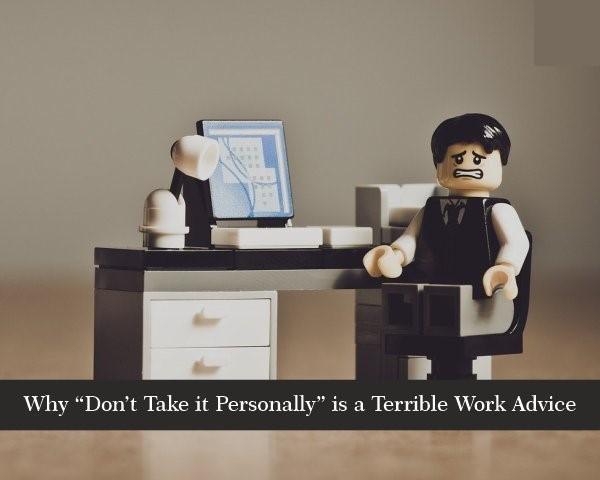The modern workplace is extremely fluid. The only thing you can realistically expect to be constant is change. However, as businesses change and adapt, they can have a myriad of effects on their workforce, one of the most common ones being conflict. This can arise in any number of situations, such as contentious performance appraisal methods, differences among team members, tough remedial discussions, a company-wide restructuring, gaps in collaborative abilities, and individual perceptions regarding a worker’s personal career goals. All of these situations are a fairly standard part of doing business and are fairly common across companies and industries. But the term “not taking it personally” is one of the worst ways to approach the problem, or advise someone approaching it. This blog will attempt to explore why.
The Don’t Take It Personally Philosophy
In nearly every situation creating conflict or differences among the workforce, “don’t take it personally” is an often-used phrase. In most cases, the person saying this is genuinely interested in resolving conflict and easing rough transitions. The phrase stems from the idea that one’s personal life (including one’s convictions, opinions, background, and ideas) is entirely separate from one’s professional life. “Don’t take it personally, it’s only business” is a catch-all phrase, ostensibly aimed at calming people down, or pointing out that their reaction need not be out of proportion, since they shouldn’t take the conflict as specifically targeted at them.
The Problem With Depersonalizing Workers
Of course, given what we now understand about what motivates and drives workers, asking someone in the workplace to “not take it personally” is an outdated and absurd notion. It invalidates all the time and effort a worker invests in their job. Remember, most of your workers likely spend the majority of their waking hours at your business. They get up every day, rush through traffic, fight through commuters, clock in, perform well, and make sure they rack up hours on the work schedule. The fact that your workers put themselves through this routine almost every day implies that they take their job very seriously, and are committed to their roles and responsibilities.
For many such workers, being asked to “not take things personally” is almost like workplace gaslighting. A person who commits to the job leads by example, and consistently performs above par obviously takes their job personally. Conversely, workers who don’t take their job personally are less likely to display these traits. By telling committed workers not to take what they perceive as unfair treatment or being wronged too personally, you’re effectively invalidating their deeply rooted dedication to their role as well as to your organization as a whole. It is almost uncaring to ask them to not take their work and its related aspects personally.
Why Workers Who Take Their Job Personally Are Good
Consider one of your best-performing employees. They are likely motivated individuals, and often inspire others in the team to do better as well. They constantly look for innovative solutions and ways to do their job better. Without a deep personal connection with their role and with their employer, it is very hard to find workers with that level of commitment. Therefore, a worker who takes everything about their role personally is usually a far better performer than one who has depersonalized their role.
Also, consider the significance business leaders and workforce managers place on engaging with employees. Employee engagement is designed to develop a relationship based on trust, transparency, and empathy between the employer and the employee. Engaged workforces tend to perform exceptionally well and have higher levels of job satisfaction. The very nature of engagement, however, appeals more to the personal aspects of a worker than their professional ones. As such, it seems counterproductive to encourage workers to “not take work personally”. Otherwise, you could have a poorly motivated and disengaged workforce on your hands.
Finding A Middle Ground
Of course, all these tangents don’t make it easy for managers to maintain efficient workforces. On one hand, you can’t let conflicts escalate into full-blown obstacles that impact business productivity as well as the safety and friendliness you want in your work culture. On the other hand, you don’t want to risk alienating workers by invalidating them and asking them not to take work too personally. So what do you do?
The key differentiating factor here is whether a worker is personally and deeply committed to their role, or whether they are unable to manage boundaries and emotions in times of conflict. Having a passion for one’s job is a very admirable and desirable trait among most workforces. But when workers begin to measure their self-worth based on their role, they may find it very difficult to tolerate mistakes and mishaps. In fact, they take any hiccup or conflict as a direct assault on their self-esteem, and can often react accordingly (and sometimes inappropriately).
Taking work personally will open up a worker to conflict and challenges. Many will inevitably face setbacks and disappointments during the length of their professional careers. But is the alternative really better? A workforce that is disengaged and disenfranchised, with no desire other than to do the bare minimum in the workplace, is far less desirable. The challenge for HR managers and business leaders here is to improve their conflict management skills, instead of opting to alienate or invalidate their workers. Constructively helping workers to establish boundaries and manage their reactions to criticism or another conflict can often go much further.
Also read about:
Womens Sweaters Come In All Fabrics
Advantages of utilizing Human Hair Wigs
How to pass the GAQM CDCP 001 Exam Dumps 2021
















